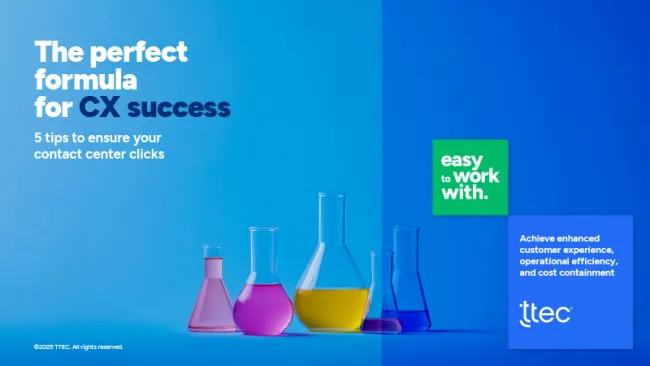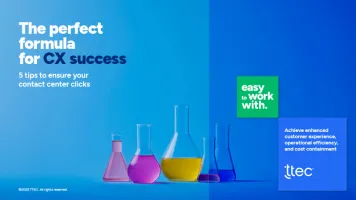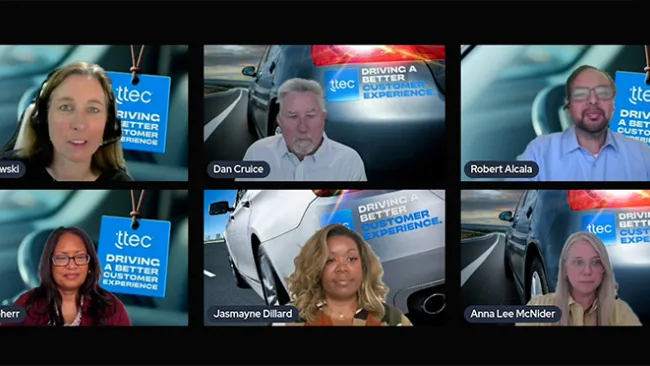As pharmaceutical companies move closer to developing a COVID-19 vaccine, there are massive logistical challenges in distributing, administering, and monitoring them. Organizations are moving faster than ever before to produce, distribute, and communicate with stakeholders about the vaccine rollout.
Check out our podcast, “In their Own Words: Vaccine Patients Share their Experiences” for more information about CX and vaccine management.
Learn how TTEC ensures an organized, demand-based, safe consumer vaccination experience.
At the heart of all these challenges are people. Gaining the public’s trust and cooperation is essential. They will be looking for supportive assistance and reassurance from professionals and experts in an uncertain time. Yet, many of the agencies involved in the rollout lack funding and resources to deliver such a grand-scale effort. Public health departments, government agencies, insurance companies, and others face staff, budget, and resource constraints when it comes to educating people about the new vaccines, much less administering them and providing ongoing support.
At TTEC, with decades of experience guiding organizations across different industries in transforming customer/member/citizen experiences while also reducing costs, we know there are critical steps to building and managing positive customer experiences. We’ve outlined real-world examples of how digital innovation combined with human expertise can enable key players to quickly mobilize trained staff to provide fast vaccine support and drive success rates through CX.
Building trust
Concerns about the safety and effectiveness of a coronavirus vaccine and the unprecedented pace of vaccine development have left many Americans skeptical about the safety of COVID-19 immunizations. In a September Pew survey, only 51 percent of Americans said they would get a COVID-19 vaccine if it were available today, down from 72 percent in May.
State and local health departments will need to be transparent in guiding the public through the steps of vaccine development, distribution, administration, and tracking. Proactively explaining vaccine efficacy and safety testing measures will be critical.
This is where well-trained, experienced contact center agents equipped with effective technology solutions play an important role in communicating public health information about the vaccine and promoting confidence and uptake. For example, in ramping up for open enrollment, a regional health insurance company that offered plans in 10 states struggled to find expert associates for part-time work in certain locations. We helped the company implement a Smart Seasonal strategy using a highly skilled yet cost-effective offshore pre-sales workforce for initial open enrollment inquiries and qualifications.
This allowed licensed, U.S.-based associates to focus on more complex sales and enrollment activities, further enhancing the member relationship. Callback assist allowed prospective members to receive a call when it was their turn to speak to an associate, rather than wait on hold. And for associates, a robust knowledgebase and real-time coaching helped enable dynamic improvements to call flow and sales processes.
As a result, cost per enrollment decreased by up to 45 percent and sales conversions rose 29 percent from the previous year. In other cases, healthcare organizations used AI-powered chatbots and Intelligent Voice Assistants to deflect routine questions. A similar combination of digital efficiency and skilled agents, or COVID-19 BCP support, will be key in providing the public with fast and attentive vaccine aid.
Nimble support
Flexibility and agility will also be important. As the vaccination process unfolds, health departments and pharmacy services companies like Walgreens and CVS will need to quickly ramp up and scale down customer support as needed. The Wyoming Department of Workforce Services (DWS) did exactly that when it experienced an unprecedented surge in unemployment claims at the onset of the COVID-19 pandemic.
In a partnership with the state agency, TTEC delivered fast results using cloud and automation technology to deflect calls from the department’s at-capacity system and a team of 30 experienced at-home agents to answer calls and lighten the in-house agents’ workload. Using at-home agents enabled the DWS to rapidly expand its capacity, and scale back when call volume receded. And by routing calls to the appropriate resource—AI or human agent—claimants were able to file claims and get their questions answered with minimal wait times.
Speed to ramp
Rapidly training an army of employees in the collection and analysis of vaccine data, including keeping track of who has received which doses, appropriately escalating and reporting reactions to the vaccine, and ensuring that immunization targets are being reached, among other requirements, poses another challenge.
Equipping learners with customized digital learning tools, including AI-powered simulations and skills and competency assessments is one of the most efficient ways to rapidly train a large group of people. For instance, as a result of a surge in e-commerce activity, one of the world’s leading online retail marketplaces needed to remotely train and deploy hundreds of agents across several countries and time zones to monitor transactions for fraudulent activities.
We collaborated with the client on identifying specific topics for a customized virtual training program that accounted for the top volume drivers to keep the training focused and increase efficiency. To further expedite the program, we ran four parallel virtual batches which were monitored and observed by program-certified training and operations leaders to assess training efficacy.
All training batches went live as scheduled and we succeeded in ramping up to 170 team members in less than two months. In fact, remote training throughput came in at 91 percent compared to 88 percent in a brick-and-mortar contact center.
Help is coming
As Anthony Fauci, director of the National Institute of Allergy and Infectious Diseases, told CNN’s Jack Tapper, “help is coming, and it’s coming soon.” However, the magnitude of the challenge that the U.S. and other countries face in rapidly distributing, administering, and monitoring the coronavirus vaccines as they become available can’t be overstated. And while there isn’t an easy solution, customer experience leaders know that gaining consumer trust is the first step to success.
Contact us to learn how TTEC can provide vaccine support, quickly and efficiently.














